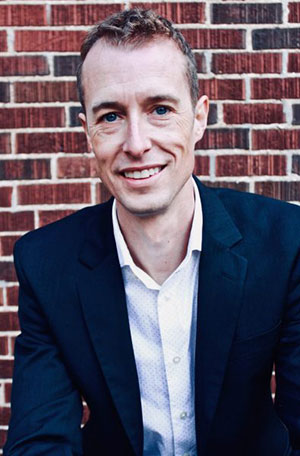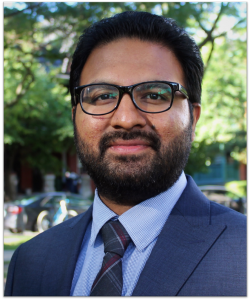Medical affairs is an exciting career field for PhDs, particularly for those with backgrounds in biological and medical sciences. This can include working as a medical science liaison (MSL). Over the past few months, Maren Wood and I have interviewed a handful of MSLs, and learned about a small Canadian non-profit organization called Meristem Health.
Here’s my interview with one of the organization’s founders, Ryan Ward, PhD, and Hamza Taufique, PhD who works as an MSL.
Jen: What is Meristem Health and why did you start it?

Ryan: Meristem Health is a not-for-profit organization that aims to make impactful improvements to the Canadian health care system. Our mission statement is to improve the health of Canadians by fixing the pressing problems faced by patients, their families and their physicians in under-supported sectors of the Canadian health care system. We do this by proactively engaging key opinion leaders to uncover areas of high medical need and then work in partnership with health care providers to develop and implement innovative solutions.
The idea for Meristem Heath came from observations I and another co-founder made while acting as medical science liaisons in the pharmaceutical industry. As industry representatives, we usually engage with the subset of health care providers (HCPs) that use pharmaceutical products, and often try to understand the challenges they face with the intention of offering solutions. This activity is common to MSLs across the industry and can greatly improve the health care offered to patients. Where there are marketed drugs or devices, this activity generates groups of HCPs surrounded by industry support; where there are no such products, HCPs are left without industry support and the unique skills we can bring to bear on a problem. Meristem Health aims to bridge that gap by offering support to HCPs in sectors of the Canadian health care system where industry support does not exist.
Jen: I first heard of your organization from, you, Hamza. How did you get involved?

Hamza: I met James Scrivens, executive director of Meristem Health, at a knowledge and networking event on rare diseases in Toronto. During our conversation, I expressed my interested in pursuing a medical science liaison role which led to him telling me about Meristem Health. Dr. Scrivens then connected me with Ryan Ward who took the time to tell me more about the vision he had for Meristem Health. I was looking for opportunities to attain experience as an MSL and I applied for an MSL position with Meristem Health. I went through the interview process and was eventually offered a position to join Meristem Health.
Ryan: Hamza recently completed his PhD and has an exceptional record of community involvement with an interest in improving the health of his peers. He was a natural fit to join our team.
Jen: What’s been your experience with Meristem Health so far?
Hamza: I feel very fortunate to be part of the Meristem Health team, as I work with a small but motivated group of individuals. When I joined, my goal was to leverage my academic and non-academic skills to further the vision of Meristem Health, learn more about the Canadian healthcare system and the pharmaceutical industry, and to gain experience as an MSL. Having Dr. Ryan Ward and Dr. James Scrivens lead the Meristem Health organization has immensely helped me in better understanding the pharmaceutical industry. Furthermore, I am working on projects where I interact with physicians and other healthcare workers which allows me to polish my understanding of the Canadian healthcare system, to better my communication skills and to gain experience as an MSL. So, in short, my experience with Meristem Health has been personally and professionally fulfilling.
Jen: How does the work you are doing relate to your doctoral experience?
Hamza: I recently completed a PhD in molecular genetics from the University of Toronto. My doctoral work was very heavily based on basic science and technical laboratory-based work. However, as with any doctoral student, I also honed my research and science communication skills. I look at the work I do with Meristem Health as an application of the scientific knowledge and the skills that I gained through my doctoral work. This could include reading and presenting clinical research papers, familiarizing myself with a new therapeutic area or communicating with healthcare providers. In all of these avenues, I rely on my doctoral experience of research, communication and innovation to guide my work with Meristem Health.
Ryan: The MSLs at Meristem Health function just like those in the pharmaceutical industry, and the traits and abilities which make them successful are the same that make a successful doctoral or postdoctoral scientist: people who are scientifically literate, can communicate complex information in simple and approachable terms, are curious, strategic and who can build respectful relationships. Unfortunately, these abilities are often overlooked due to a focus on the technical expertise developed while working in a lab, but they are the skills that prospective employers are most interested in.
Jen: What do you want graduate students, PhDs, and postdoc scientists to know about working in medical affairs or as medical science liaisons?
Ryan: With very few exceptions, the people working on medical affairs teams are amazingly talented and brilliant individuals, all with the common goal of improving the lives of patients. It is a great community to be a part of.
Jen: As you know, we at Beyond the Professoriate are committed to helping PhDs transition into meaningful careers, both inside and outside academia. Do you see Meristem Health as playing a role in this? If so, how?
Ryan: Absolutely: Meristem Health aims to attract, train and engage the top PhDs and postdocs who aspire to progress to an industry MSL role. We see a role at Meristem Health as a first platform from which to spring to an exceptional career.
Hamza: Yes, most definitely. Meristem Health provides an exceptional opportunity for doctoral students to apply their scientific expertise and other skills to a meaningful role as an MSL and in doing so gain experience by working on projects that have the potential of making a difference in the Canadian healthcare system.
Jen: What’s most surprised you about your experiences so far?
Ryan: I’m always inspired by the attention, effort, and dedication shown by PhDs and postdocs who are interested in transitioning from academia to the pharmaceutical industry. I’ve seen this first hand at Meristem Health and also while volunteering as a mentor at the University of Toronto life science career development society industry team case study.
Hamza: I have been most surprised by the power of having an open discussion. In my role as an MSL with Meristem Health, I interact with healthcare providers and often our discussions lead to very interesting potential project ideas. These conversations have allowed me to connect with some wonderful individuals working in healthcare who genuinely value improving the lives of Canadians.
Jen: What’s next for you?
Hamza: I had decided to pursue a graduate degree in molecular genetics and neuroscience because I had a passion for these disciplines and a general curiosity about how biological systems function. My graduate training at the University of Toronto equipped me with scientific expertise as well as technical and experimental knowledge in my area of interest. During my graduate degree, I had also decided that I wanted to leverage the skills that I have learned during my graduate education to a more applied role. Hence, I pursued an MSL role with Meristem Health where I got the chance to apply my academic knowledge and skills. I am now looking at other avenues where I can apply my scientific training and skills, whether it be an MSL role or another role where I believe that I can make a difference. My graduate training and work experience with Meristem Health have provided me a with a good foundation to take the next step in my career.
Jen: Any final thoughts you’d like to share with our readers?
Hamza: I would like to share a few things that I have learned over the past few years:
- Engage in career exploration: there are career options out there that graduate students may not even be aware of. I have learned to talk to people from various backgrounds to discover what they do and in doing so I have discovered many careers that I think would be suitable for me given my background.
- Identify what sets you apart: What is it about you that is unique? I have found that reflecting on your interests and values can aid in identifying unique features about you.
